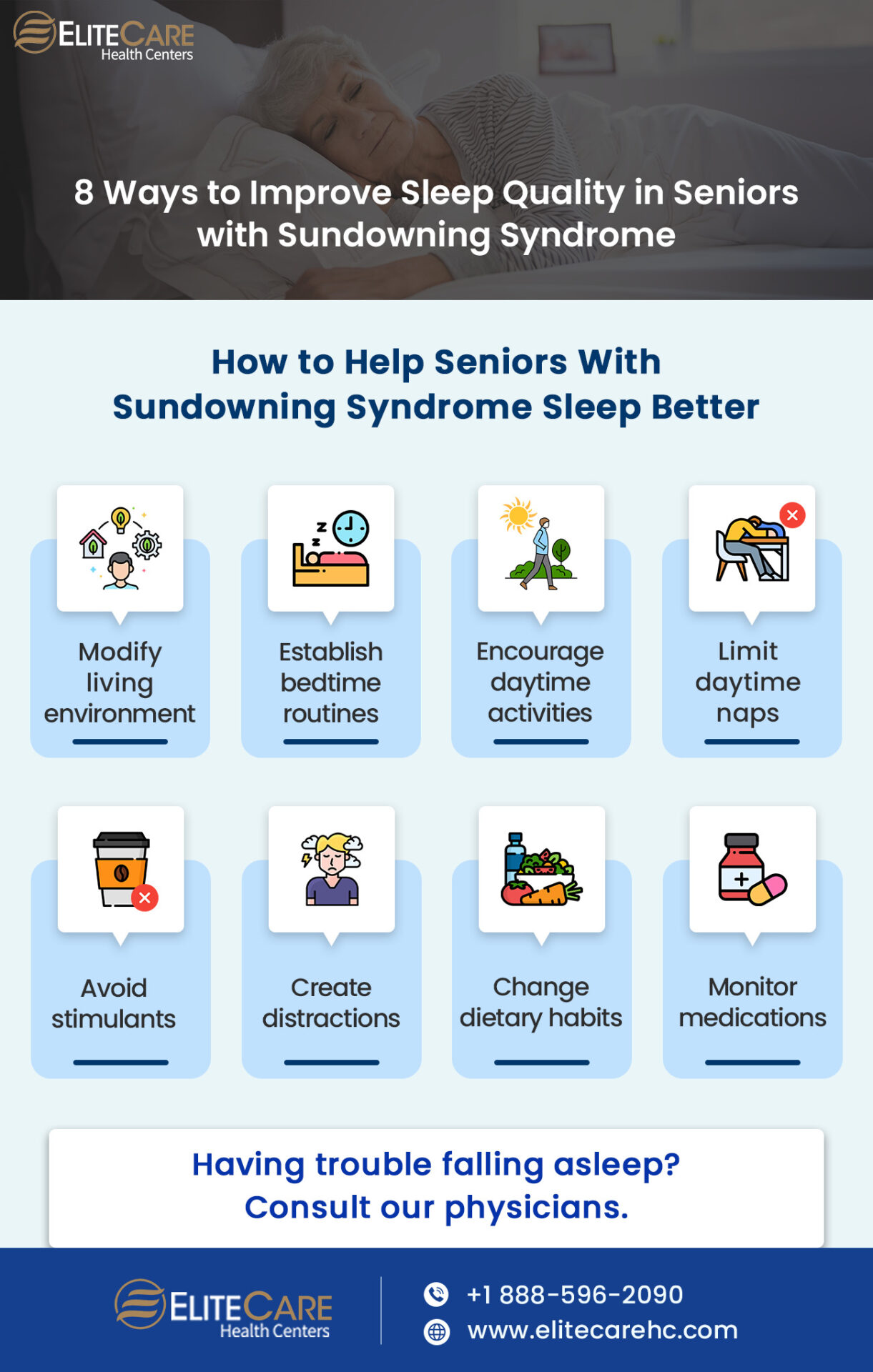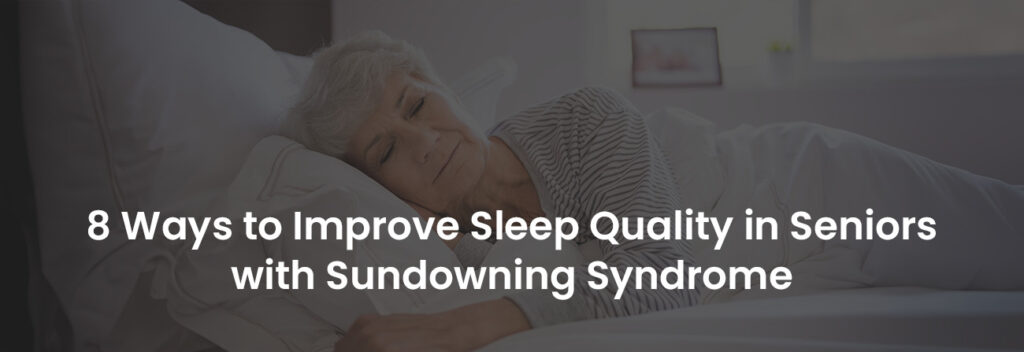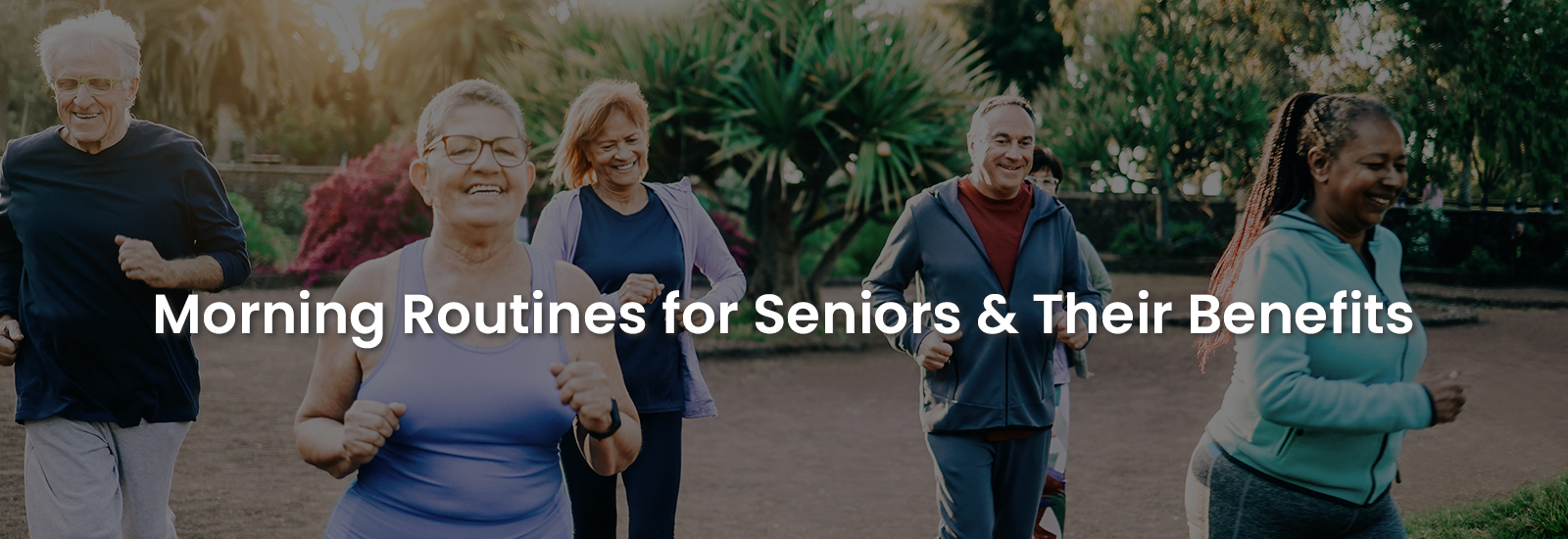
Also known as “sundown syndrome” or “sundowning,” sundowning syndrome is a cluster of symptoms commonly observed in seniors experiencing cognitive impairment or dementia. In this condition, some behavioral and psychological symptoms tend to worsen during the late afternoon and evening hours, usually starting around sunset. Sundowning usually improves or resolves by morning, only to recur in the late afternoon or evening again. While it primarily affects individuals suffering from dementia, it can also develop in older adults without any pre-existing cognitive impairments.
Sundowner syndrome is both emotionally and physically challenging to manage. One of the most common symptoms of this condition is disrupted sleep patterns, which can cause additional health problems in the long run.
In this blog post, we will share detailed insights into the common symptoms of sundowning and provide a few practical tips for good sleep. Read on to learn more.
Symptoms of Sundowner Syndrome in Seniors
While the exact cause of sundowning syndrome remains unknown, understanding the symptoms associated with the condition can help caregivers and family members provide the best possible care and support. The following are some common symptoms of sundowning syndrome.
- Heightened restlessness and agitation
- Confusion and disorientation
- Drastic mood swings characterized by sudden irritability, anxiety, or even aggression
- Verbal and vocal outbursts
- Hallucinations or delusional thoughts
- Tendency to wander aimlessly
- Sleep disturbances
- Hypersensitivity to stimuli
- Resistance to care
- Increased memory impairment
If caregivers and family members recognize any of these symptoms, it is crucial to consult a primary care physician or get assistance from a senior care service provider.
How Does Sundowning Syndrome Affect Quality Sleep?
1. Disruption in circadian rhythm
The symptoms of sundowning syndrome exacerbate during late afternoon and evening, disrupting the body’s natural circadian rhythm. As the sun goes down, the body’s internal clock influences the production of hormones like melatonin, signaling that it’s time to wind down and prepare for sleep.
In sundowning syndrome, this circadian rhythm becomes dysregulated, and individuals get confused between night and day. As a result, it becomes challenging for affected individuals to recognize the appropriate time for rest.
2. Increased anxiety and agitation
As the evening approaches, agitation and anxiety often intensify in individuals suffering from sundowning syndrome. The restlessness and mental distress they experience can make it incredibly challenging to relax, eventually disrupting quality sleep.
3. Hallucinations and delusions
For some individuals, the nighttime hours may bring about hallucinations or delusional thoughts. These altered perceptions can be highly distressing and frightening, causing them to feel unsafe or apprehensive about lying down to sleep.
4. Environmental sensitivity
During sundowning episodes, seniors often become hypersensitive to environmental stimuli, including light, noise, and temperature changes. The presence of bright lights or loud noises in the evening can easily disrupt their bedtime routine or make them wake up anytime during the night.
How to Help Seniors With Sundowning Syndrome Sleep Better
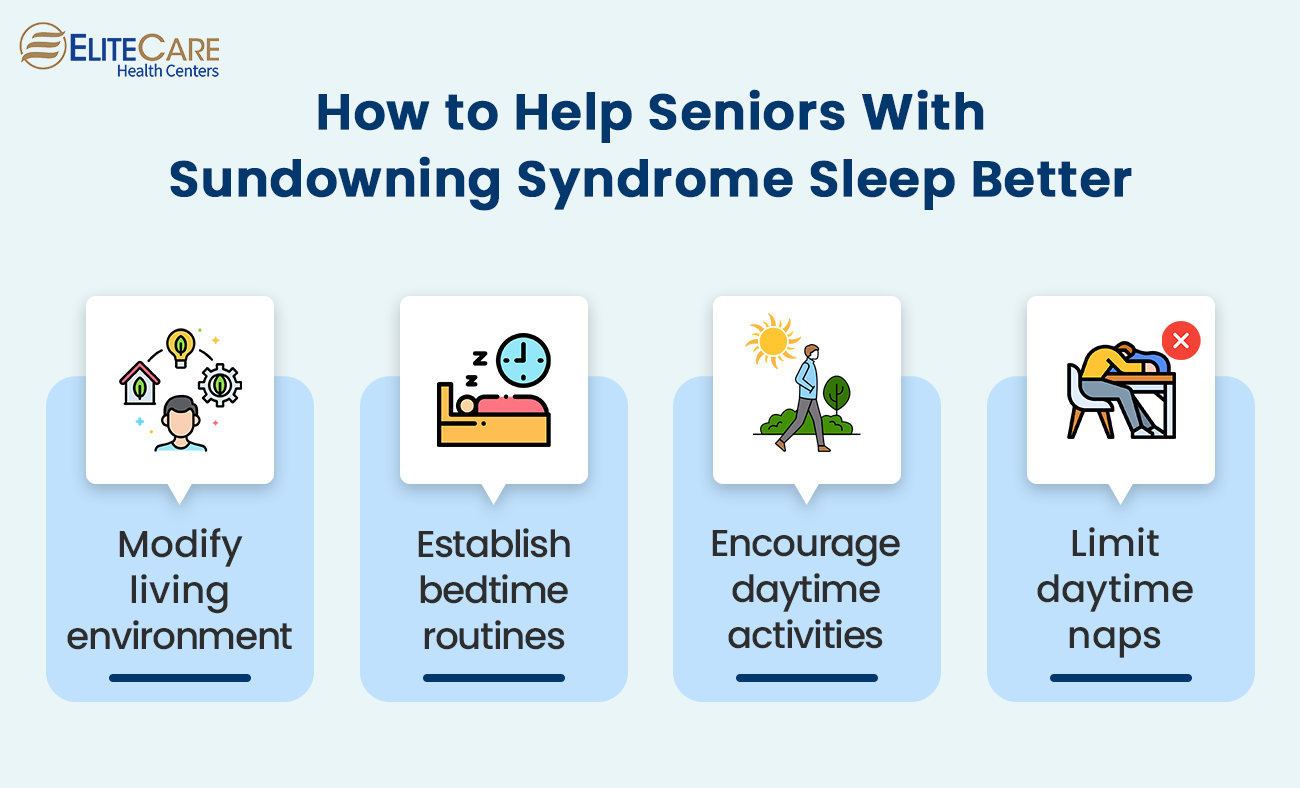
1. Modify their living environment
Since seniors suffering from sundowning syndrome have increased sensitivity to stimuli, it is crucial to keep the bedroom free from excessive noise and bright lights. Consider using blackout curtains to block out external light during the evening hours. Check the temperature and set it according to their preferences and comfort to promote relaxation.
The National Institute on Aging recommends that caregivers should open the blinds or window coverings in the morning in order to let natural light in. It will help seniors wake up at the right time and set their internal clock accordingly.
2. Establish consistent bedtime routines
Try to fix a regular bedtime and wake-up time for seniors to reinforce their body’s natural sleep-wake cycle. Do not let them use screens before bedtime as the blue light emitted from screens can impact the quality of sleep significantly. Caregivers can also incorporate relaxation techniques such as deep-breathing exercises or meditation into the bedtime routine to help seniors relax.
3. Encourage daytime activities and exposure to natural light
Discuss with them and prepare a day-to-day routine where they will complete most of their activities during the day. It can help reduce restlessness and promote more restful sleep at night.
Additionally, ensuring adequate exposure to natural light during the day can reinforce their body’s circadian rhythm and help regulate the sleep-wake cycle more effectively.
4. Limit daytime naps
As we age, our sleep patterns automatically change due to a shift in our internal circadian rhythm. As a result, older adults often wake up earlier in the morning and take frequent daytime naps to compensate for the reduced overnight sleep duration. Encourage seniors to avoid long naps during the day to get restful sleep at night.
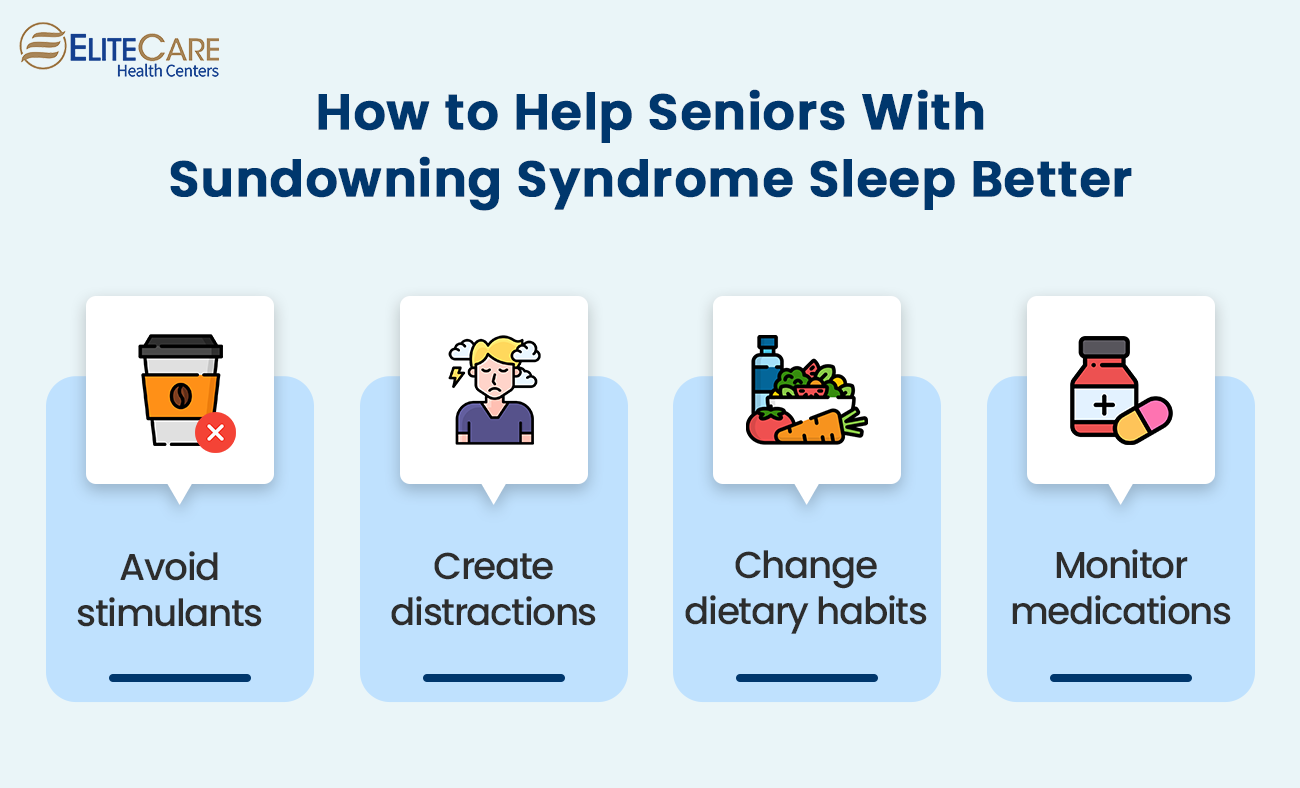
5. Avoid stimulants
Reduce the intake of any kind of beverage like coffee, tea, soft drinks, energy drinks, etc., which contain caffeine. Caffeine blocks the action of adenosine, a neurotransmitter that promotes relaxation and drowsiness. Since this stimulating effect can last for several hours, it is best to avoid such caffeine during the afternoon and evening.
6. Create distractions
Seniors suffering from sundowning syndrome sometimes experience hallucinations or delusions that can frighten them and disrupt their sleep. In such situations, offer reassurance and validate their emotions and feelings first. Then try to gently distract and redirect their attention to more positive or calming topics or activities.
For instance, if they experience a distressing hallucination, suggest looking at a photo of a loved one or discussing pleasant memories. Caregivers can also use sensory distractions like soothing music, nature sounds, or a soft blanket to provide comfort and ease the senior’s anxiety.
7. Change dietary habits
To ensure quality sleep, avoid giving seniors heavy or rich meals close to bedtime, as they may lead to discomfort or indigestion. Also, encourage seniors to stay hydrated, but limit their fluid intake before bedtime to prevent them from waking up at night.
8. Monitor medications
Review medications with their primary care physician to identify any medicine that might contribute to sleep disturbances. Discuss this with the physician and explore alternative medications or adjust dosages if necessary to improve sleep quality.
Each senior’s experience with sundowning syndrome is unique, so a personalized approach to sleep management is essential. Be patient and understanding as it may take time to identify the most effective strategies to improve sleep. By fostering a supportive and compassionate environment, caregivers can significantly enhance the sleep quality and overall well-being of seniors with sundowning syndrome.
The Bottom Line
Patience and compassion are crucial to managing cognitive impairment like sundowning syndrome in seniors. By providing a nurturing and understanding environment, caregivers can help their loved ones find comfort and relaxation, facilitating a more peaceful and restful sleep experience.
Consult a primary care physician and take a holistic approach to address sleep disturbances caused by sundowning syndrome. Contact EliteCare Health Centers, one of the best healthcare centers specializing in senior care services. We are a medical clinic in Florida, and we also offer a wide range of health and wellness services. Book an appointment with our primary care physicians now!
